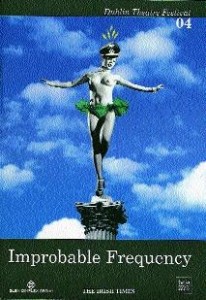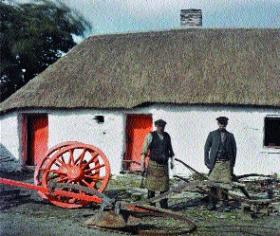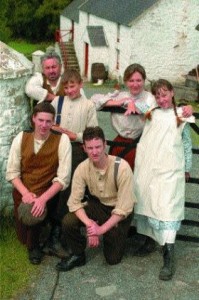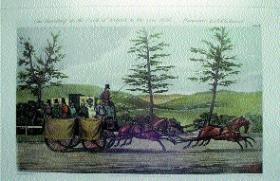TV Eye
Published in Issue 4 (Winter 2004), Volume 12Improbable Frequency
Dublin Theatre Festival, 27 Sept.–9 Oct. 2004
Rough Magic Theatre Company
by Eamon O’Flaherty
 History-related TV over the last quarter has been a bit disappointing. RTÉ’s main contribution was a pair of half-hour programmes in the ‘Townlands’ series that, while informative and entertaining, hardly stretched the medium: ‘Not Fade Away’, a mildly interesting but thin study of two women French photographers, and ‘Bianconi’, yet another film about the Italian coach operator, were about the height of it. Grace Neville of UCC did good work as a historical adviser on the former programme, but she was let down by the tendency of historical documentary-makers to blur the edges of the historical narrative. Good, but could do better. In the spirit of the summer schedules, the Bianconi film was hosted by two relaxed country gentlemen—charming but trivial, emphasising the feel-good factor in Irish history. There is nothing wrong with that in itself: Irish history needs to emphasise the charm of everyday life as well as the tragic narrative.
History-related TV over the last quarter has been a bit disappointing. RTÉ’s main contribution was a pair of half-hour programmes in the ‘Townlands’ series that, while informative and entertaining, hardly stretched the medium: ‘Not Fade Away’, a mildly interesting but thin study of two women French photographers, and ‘Bianconi’, yet another film about the Italian coach operator, were about the height of it. Grace Neville of UCC did good work as a historical adviser on the former programme, but she was let down by the tendency of historical documentary-makers to blur the edges of the historical narrative. Good, but could do better. In the spirit of the summer schedules, the Bianconi film was hosted by two relaxed country gentlemen—charming but trivial, emphasising the feel-good factor in Irish history. There is nothing wrong with that in itself: Irish history needs to emphasise the charm of everyday life as well as the tragic narrative.

RTÉ’s two half-hour programmes in the ‘Townlands’ series—one a study of two women French photographers and the other on Charles Bianconi—while informative and entertaining, hardly stretched the medium. (RTÉ Stills Library)
TG4, though running on a shoestring, continues to offer a more interesting approach to history than the better-resourced channels. A documentary history of the Jews in Ireland broadcast in September was probably the best Irish history-related programme shown over the last quarter. Meanwhile, BBC Northern Ireland have obviously spent a great deal of money on Century Farm, billed as ‘a major new documentary series’. This is yet another variation on the ‘reality TV’ format, based on the idea of placing a modern family in an Edwardian Ulster rural setting and filming their ability to cope. This type of experiment has been done before (The Edwardian House, The World War II House, etc.), and, while it offered intriguing possibilities the first time around, any value it might have had as an insight into social history is now surely exhausted. What we see, not to our great surprise, is that people brought up in the conditions of late twentieth-century life are not capable of living under entirely different circumstances. Instead of telling us anything about the past, this type of television becomes a piece of voyeurism. We know that the participants are our contemporaries and therefore we learn nothing about the social lives of their ancestors.
Unsated by recent television fare, TV Eye instead casts a glance at that other aural/visual medium—theatre. Compared to the docu-soap—offering so much but delivering so little—a play can actually provoke our attitudes to history and bring them to the surface. Improbable Frequency is a slightly surrealist and Brechtian musical set in Ireland during the Emergency. If it is necessary to establish a television connection then I remind readers of the TV show Nighthawks, broadcast on RTÉ2 (then Network 2) in the late ’80s/early ’90s. For those old enough to remember, one of the amusing aspects of this late-night TV cabaret was the way in which it satirised aspects of the past, including the early history of Irish TV. Pre-television Ireland was evoked by the preservation of Eamon de Valera (played by Arthur Riordan) in a fridge. Arthur Riordan’s creative obsession with Eamon de Valera and the world of the mid-twentieth century reaches something of an apotheosis in Improbable Frequency. But the play goes far beyond this to suggest metaphysical possibilities around historical events. There is even something here for the philosopher of history.

BBC Northern Ireland’s Century Farm—yet another variation on the ‘reality TV’ format (BBC NI)
In this centenary year of the Abbey Theatre it is remarkable that public theatre—as opposed to classical museum theatre—is brilliantly exemplified by companies like Rough Magic. Improbable Frequency centres on the improbable fact that Ireland during the Second World War chose virtually to ignore the war as understood and experienced by the rest of Europe. The play centres on an interesting collection of creative characters from Emergency Ireland: Flann O’Brien/Myles na gCopaleen; Erwin Schrodinger of the Institute of Advanced Studies; and John Betjeman, the English poet then attached to the British High Commission in Dublin. An unfortunate Englishman, chosen for his abilities as a code-breaker, is sent by British intelligence (!) to try to make sense of all this. The entirely improbable plot also includes a camp Anglophobe radio presenter called O’Dromedary, a pro-Nazi IRA man called Muldoon, and a nest of spies circling around the Nazi-leaning Berlin-style Red Bank Café in Dublin. It is beyond the ability of this reviewer to do justice to the talent and energy of this piece of theatre, but I must commend the way in which larger issues of Irish independence in wartime were explored. The hapless and brilliant Schrodinger produces a machine that can make possibilities probable, thereby changing the course of history. Thus the future can take on a variety of different forms—a German Ireland, a British Ireland or an Irish Ireland.
 Counter-factual propositions are very fashionable in academic history these days. Speculating as to what might have been, which was once derided by serious historians, has in our time become the done thing among practitioners of the art such as Simon Schama. Irish historians have tended to avoid this kind of speculation, perhaps through deliberate suppression of the imagination. We can even talk about retrospective denial, given our painful awareness of the costs of neutrality for our relationship to the post-1945 world. Riordan’s play brings us back, if only via a very imaginative fiction, to a suppressed past when neutral Ireland was a very different and very possible or maybe even probable state. Historians, please take note.
Counter-factual propositions are very fashionable in academic history these days. Speculating as to what might have been, which was once derided by serious historians, has in our time become the done thing among practitioners of the art such as Simon Schama. Irish historians have tended to avoid this kind of speculation, perhaps through deliberate suppression of the imagination. We can even talk about retrospective denial, given our painful awareness of the costs of neutrality for our relationship to the post-1945 world. Riordan’s play brings us back, if only via a very imaginative fiction, to a suppressed past when neutral Ireland was a very different and very possible or maybe even probable state. Historians, please take note.
Eamon O’Flaherty lectures in history at University College Dublin.
















